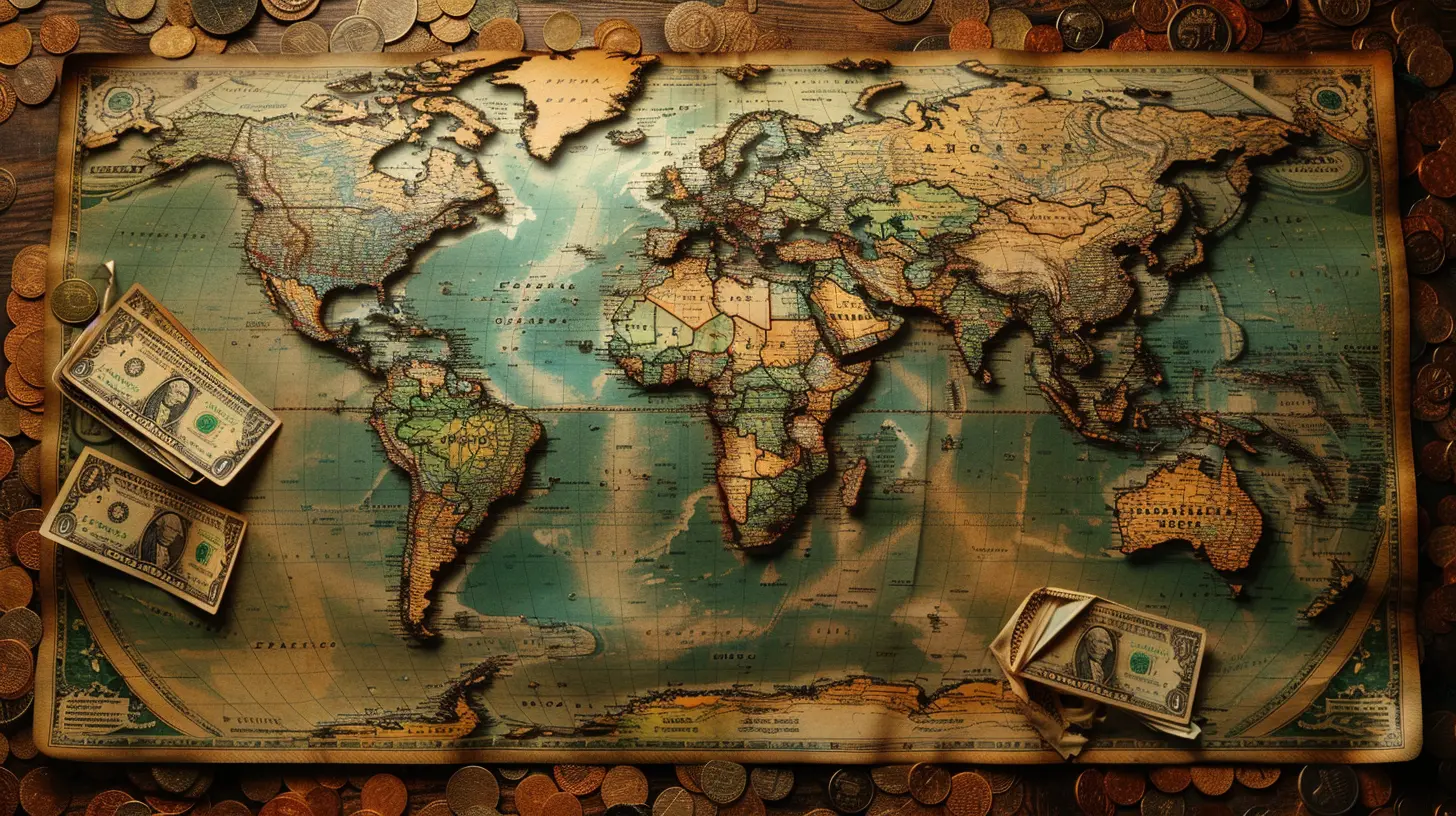How Oil Prices Shape Economies Worldwide
5 December 2024
Oil prices. The term alone can spark debates, move stock markets, transform nations, and disrupt global economies. But have you ever stopped to wonder why oil prices are such a big deal? How can one commodity have such a profound influence on economies worldwide? Strap in, folks, because we’re about to uncover the many ways that fluctuating oil prices shape economies, and, spoiler alert, it impacts you more than you might think. 
Understanding the Basics of Oil Pricing
Before diving into how oil prices shape economies, let’s break down what determines those prices in the first place. At its core, oil pricing operates on the classic economic principles of supply and demand.When oil supply is high and demand is relatively low, prices drop. Simple, right? But when geopolitical tensions, natural disasters, or production cuts choke supply, prices shoot up like a rocket. Ever hear about OPEC (Organization of the Petroleum Exporting Countries)? They’re the cartel responsible for managing a significant portion of the world’s oil supply, and let me tell you, their decisions can send ripples across the globe.
Oh, and we can’t forget speculation. Traders in financial markets bet on the future price of oil. Think of it like gambling, but instead of poker chips, they're trading barrels of crude. A mere rumor of an oil disruption can send prices spiraling. 
Oil Prices and Inflation – A Chain Reaction
One of the first things that skyrocketing oil prices impact is inflation. You’ve felt it, haven’t you? When oil prices jump, the cost of gas creeps up at the pump, and suddenly, that weekly grocery run or delivery fee feels a little steeper.Why? Because oil touches nearly every aspect of the supply chain. Trucks transporting goods? They run on diesel. Planes flying overseas? Yep, powered by aviation fuel. Factories producing products? Many depend on oil-based power sources or petrochemical materials. The result? Higher oil prices cause a domino effect, making everyday goods and services more expensive.
Inflation, in turn, makes your money worth less over time. It’s like trying to fill a bucket with a hole in the bottom—no matter how much you pour in, you lose a little bit. 
Winners and Losers in the Oil Game
Here’s where things get interesting. Not every country reacts to fluctuating oil prices the same way. Some economies win big, while others lose. Let me break it down for you.Oil-Exporting Countries: The Winners
If your country is blessed with vast reserves of oil, high oil prices are akin to hitting the economic jackpot. Think of nations like Saudi Arabia, Russia, and Venezuela. When prices climb, these countries rake in billions from exporting oil. That surplus cash can fund infrastructure, education, and health care—or, in some cases, it just boosts government coffers.For example, in the Middle East, oil-rich nations have used their revenues to transform barren deserts into bustling metropolises, like Dubai. But there’s a catch. When oil prices collapse, these same countries often struggle because their economies are overly dependent on oil. It's like putting all your eggs in one basket and then accidentally dropping it.
Oil-Importing Countries: The Strugglers
Now, flip the script. Countries that import oil—like the United States, India, and much of Europe—are hit hard when prices surge. Their transportation, manufacturing, and agricultural sectors have to shell out more for fuel, and this cost is often passed on to consumers. High oil prices can slow down economic growth, increase trade deficits, and lead to an overall pinch in people’s wallets.But here’s the thing—these nations can sometimes benefit when prices drop. Cheaper oil means cheaper imports, leading to lower costs across industries, higher disposable income for consumers, and potentially economic booms. It’s a double-edged sword, my friend. 
How Oil Prices Impact Currencies
Ever notice how oil prices seem tied to currency fluctuations? There’s a reason for that. For oil-exporting nations, oil revenues are a major source of income, often denominated in U.S. dollars. Let’s take Russia as an example. When oil prices rise, the Russian ruble tends to strengthen, and when prices fall, well, the ruble takes a hit.Now let’s consider the U.S. dollar. Oil is predominantly traded in dollars, so when oil prices rise, countries need more dollars to buy the same amount of oil. This often strengthens the greenback, but it can also lead to higher commodity prices globally—something to think about the next time you’re staring at an inflated shopping bill.
Geopolitics: Oil's Tug of War
Let’s be honest—oil isn’t just an economic commodity. It's a geopolitical weapon. Nations have gone to war over oil, alliances have been forged because of it, and entire foreign policies revolve around its flow.Take the Middle East, home to over 50% of the world’s proven oil reserves. This region has been a hotspot for geopolitical conflict, and oil is often lurking in the background. For instance, consider the oil embargo of the 1970s. OPEC countries cut off oil exports to the U.S. and Europe, causing a global energy crisis. That one decision wreaked havoc on economies worldwide.
Even today, countries strategically build up their oil reserves as a buffer against potential disruptions. It’s like stashing away canned food for the apocalypse—you hope you won’t need it, but boy, will it come in handy if things go south.
Renewable Energy and the Oil Price Tug-of-War
Here’s a question: could renewable energy break oil’s stranglehold on the global economy? Well, it’s complicated.Countries are increasingly investing in solar, wind, and other renewable energy sources to reduce dependency on oil. And when oil prices rise, these clean energy options become more attractive. It’s like switching from fast food to a home-cooked meal when takeout gets too pricey.
But don’t count oil out just yet. Despite the global push for renewables, oil still dominates transportation and industry. The transition won’t happen overnight, and in the meantime, oil prices will continue playing a massive role in shaping economies.
The Ripple Effect on Everyday Life
So, how does all of this impact you and me, the average person?Let’s say oil prices spike. What happens? Gas prices follow suit, airfares increase, and utilities may see a price bump. If you commute, travel, or heat your home, you’re coughing up more cash. Plus, the cost of goods—groceries, electronics, even those cute sneakers you’ve been eyeing—climbs as businesses tack on the added expenses.
Now, on the flip side, if oil prices plummet (like we saw in early 2020 when demand tanked due to the pandemic), gas prices drop, and we feel like we’ve won a little lottery. But even in this scenario, oil workers may face layoffs, and oil-dependent economies can spiral into recessions.
In short, oil prices create a tug-of-war between costs and benefits, and we’re all caught in the middle.
Looking Ahead: The Future of Oil Prices
Here’s the million-dollar question: what does the future hold for oil prices? Well, your guess is as good as mine.Oil prices are unpredictable, influenced by a cocktail of factors like geopolitics, technological advances, climate policies, and market speculation. However, one thing is certain—oil will remain a key player in the global economy for the foreseeable future.
With the rise of electric vehicles and renewable energy, we may see oil’s dominance wane over time. But for now, it continues to be the lifeblood of economies worldwide.
Wrapping It Up
Oil prices are like the weather—unpredictable, impactful, and often a hot topic of conversation. From shaping inflation to influencing geopolitics, oil’s ripple effects are felt everywhere. Whether you’re filling up your car or watching your country’s GDP seesaw, the effects of oil prices are impossible to escape.So the next time you hear about oil prices going up or down, take a second to consider just how much that tiny change may be tipping the scales of the global economy. It's a fascinating, complex dance—and one that impacts us all.
all images in this post were generated using AI tools
Category:
Economic IndicatorsAuthor:

Knight Barrett
Discussion
rate this article
19 comments
Alice McGee
Great article! It's fascinating to see how oil prices influence global economies. Let's remember, every fluctuation is an opportunity for innovation and growth. Keep exploring and sharing insights!
February 13, 2025 at 12:07 PM

Knight Barrett
Thank you for your insightful comment! I completely agree—oil price fluctuations indeed present unique opportunities for innovation and growth across economies.
Meagan Henderson
Oil drives economies—adapt or be left behind.
February 4, 2025 at 9:35 PM

Knight Barrett
Absolutely, oil remains a critical driver of global economies. Adapting to fluctuating prices is essential for sustainable growth and development.
Blaine Reed
Great insights on the global impact of oil prices! It’s crucial to understand their influence on economic dynamics.
January 30, 2025 at 8:01 PM

Knight Barrett
Thank you! I'm glad you found the insights valuable. Understanding oil prices is indeed vital for grasping global economic dynamics.
Runeveil Stevens
Oil prices dictate global economies—adapt or get left behind.
January 28, 2025 at 1:55 PM

Knight Barrett
Absolutely, oil prices are a crucial driver of economic stability and growth. Nations must adapt their strategies to mitigate the impact of volatility in this vital resource.
Darby McLaury
Oil prices are a pivotal factor in global economics, influencing inflation, currency values, and trade balances. Understanding these dynamics is crucial for investors and policymakers to navigate the complexities of today's market.
January 23, 2025 at 9:57 PM

Knight Barrett
Thank you for highlighting the critical role of oil prices in shaping global economics. It's essential for both investors and policymakers to grasp these dynamics for informed decision-making.
Maris McKnight
This article raises fascinating points about the intricate relationship between oil prices and global economies. I'm curious to see how fluctuating energy sources and emerging technologies might reshape these dynamics in the future. Great insights!
January 20, 2025 at 3:29 AM

Knight Barrett
Thank you for your thoughtful comment! I agree that the intersection of energy sources and technology will play a crucial role in shaping future economic dynamics. Exciting times ahead!
Zacharias White
Insightful analysis on the global impact of oil prices—essential reading for understanding economic shifts.
January 14, 2025 at 11:31 AM

Knight Barrett
Thank you! I'm glad you found the analysis insightful and valuable for understanding these important economic dynamics.
Peregrine Moore
Great insights! Understanding oil's impact on economies is crucial for informed financial decisions.
January 9, 2025 at 8:21 PM

Knight Barrett
Thank you! I'm glad you found the insights valuable. Understanding oil's influence is indeed vital for making informed financial choices.
Theodore McCune
Oil prices are like that unpredictable friend who shows up to the party: sometimes they bring the fun (boom!), and sometimes they knock over the snacks (bust!). Let’s just hope they’re on their best behavior!
January 8, 2025 at 4:07 AM

Knight Barrett
Great analogy! Oil prices certainly have a significant impact on global economies, and their volatility keeps everyone on their toes.
Giovanna Franco
Great insights! This article effectively highlights the intricate relationship between oil prices and global economies. Considering the ongoing shifts in renewable energy, it would be interesting to explore potential future implications on economic stability as well.
January 3, 2025 at 12:26 PM

Knight Barrett
Thank you for your thoughtful comment! Exploring the implications of renewable energy shifts on economic stability is indeed a crucial area for future discussion.
Lysara McGrath
Understanding the influence of oil prices on global economies empowers us to make informed decisions. By embracing sustainable energy alternatives and innovative solutions, we can shape a brighter future, fostering resilience and growth in our interconnected world. Let's innovate together!
December 27, 2024 at 9:33 PM

Knight Barrett
Thank you for your insightful comment! Embracing sustainable energy is indeed crucial for fostering resilience and innovation in our global economy. Together, we can drive meaningful change.
Callisto Horne
Thanks for this insightful article! It's fascinating to see how interconnected oil prices are with global economies. I appreciate the clear analysis provided here.
December 24, 2024 at 8:03 PM

Knight Barrett
Thank you for your kind words! I'm glad you found the article insightful and informative.
Velma West
Oil prices significantly impact global economic stability and growth.
December 18, 2024 at 1:23 PM

Knight Barrett
Absolutely, fluctuating oil prices can influence inflation, trade balances, and investment decisions, ultimately shaping economic health globally.
Inez Hernandez
Oh, sure! Let’s just blame all our economic woes on oil prices. Because clearly, the global economy is as simple as filling up our tanks. Who needs complex factors when we've got the price of crude to worry about?
December 15, 2024 at 4:38 AM

Knight Barrett
While oil prices are just one factor, they significantly influence global economic trends and can exacerbate existing vulnerabilities. Understanding this relationship is crucial for grasping the broader economic landscape.
Josie McGlynn
This article provides valuable insights into the intricate relationship between oil prices and global economies. A must-read for anyone looking to understand economic dynamics today!
December 12, 2024 at 12:08 PM

Knight Barrett
Thank you for your kind words! I'm glad you found the article insightful.
Willow Vaughn
Great insights! Oil prices truly have a profound impact on global economies; understanding this connection is crucial.
December 7, 2024 at 7:51 PM

Knight Barrett
Thank you! I'm glad you found the insights valuable. Understanding the oil-economy relationship is indeed essential for grasping global economic dynamics.
Isla Patel
This article beautifully highlights the profound impact of oil prices on global economies. It's a reminder of how interconnected our world is, and the importance of sustainable practices for future economic resilience. Thank you for sharing these insights!
December 7, 2024 at 5:04 AM

Knight Barrett
Thank you for your thoughtful comment! I'm glad you found the article insightful and agree on the importance of sustainability in today's interconnected economy.
Dolores Barron
Thank you for this insightful article! It's fascinating to see how oil prices impact global economies in such complex ways. Your analysis highlights the interconnectedness of markets and the importance of understanding these dynamics for informed decision-making.
December 6, 2024 at 7:52 PM

Knight Barrett
Thank you for your kind words! I'm glad you found the article insightful. Understanding these dynamics is crucial for navigating our interconnected markets.
Aaron Jimenez
Thank you for shedding light on the intricate relationship between oil prices and global economies. It's crucial to understand how fluctuations in oil can impact lives, jobs, and communities. Your insights remind us of the interconnectedness we share and the shared challenges we face in navigating this complex landscape.
December 5, 2024 at 8:35 PM

Knight Barrett
Thank you for your thoughtful comment! I'm glad you found the insights valuable in understanding the complex relationship between oil prices and global economies.
MORE POSTS

Understanding the Role of Sovereign Wealth Funds in Global Markets

How to Avoid Over-Leveraging Your Business Finances

Passive vs Active Investment Strategies for Wealth Growth

Market Impacts of Supply Chain Disruptions: What You Need to Know

How to Start an Emergency Fund with Limited Income

Financial Red Flags to Watch Out for as a Business Owner

How Corporate Earnings Reports Drive Market Trends

Refinancing Your Loan: When Is the Right Time?

How Capital Gains Can Affect Your Overall Tax Bracket

Unemployment Rate Trends and What They Mean for Investors

How to Budget on a Low Income Without Feeling Deprived

How Life Insurance Can Play a Role in Tax Planning